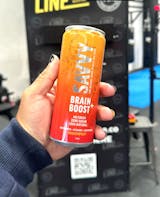
Vitamin B12 (cobalamin) is an essential vitamin that your body needs but cannot produce - it has to make it from the food you eat or the supplements you take. It is involved with a key role in energy formation, supporting healthy brain functioning and the central nervous system.
Vitamin B12 may benefit your body in many impressive ways, such as by boosting your energy, improving your memory, supporting cognitive health, and also supporting the nervous system to deal with stress and DNA synthesis.
Vitamin B12 is found naturally in animal products, and often needs to be supplemented. However, the form of supplement is particularly important - the methylcobalamin is much better than the other form cyanocobalamin, simply due to the amount absorbed by the body.
Savvy uses 500% of Australia's Recommended Dietary Intake due to the importance of this vitamin in supporting mental health, mood and memory.
|
Vitamin B12 Fast Facts
|
- Also called Cobalamin
- Important vitamin that comes only from foods and supplements
- Synthesizes serotonin which results in better mood
- Increases cognitive function
-
Improves memory
|
Main benefits for Savvy:
- Improved mood and quality of life
- Improvement of cognitive function
- Improves memory
- Reduces Anxiety
Scientifically-proven benefits of Vitamin B12
To make it easy to identify all the different studies - we will highlight them for you!
We really hope you enjoy our many years of research when formulating Savvy...
Benefit 1: Mood Boosting
The effect of vitamin B12 on mood is not yet fully understood. However, this vitamin plays a vital role in synthesizing and metabolising serotonin, the happiness brain chemical.
Scientific Sources:
Coppen, A and Bolander-Gouaille C. ‘Treatment of depression: time to consider folic acid and vitamin B12.’ in Journal of psychopharmacology, (Oxford, England). Volume 19, Issue 1, January 2005, pp 59-65 [Link]
“Both low folate and low vitamin B12 status have been found in studies of depressive patients, and an association between depression and low levels of the two vitamins is found in studies of the general population.”
Gourgeon, L, et al, ‘Intakes of folate, vitamin B6 and B12 and risk of depression in community-dwelling older adults: the Quebec Longitudinal Study on Nutrition and Aging.’ in European journal of clinical nutrition, Volume 70, Issue 3, March 2016, pp 380 - 385. [Link]
“This study provides some evidence of decreased depression risk among women with higher intakes of vitamin B6 from food, which was dependent on total energy intake, and among men with higher intakes of B12 from food, independently of energy intake.”
Penninx, BW, et al, ‘Vitamin B(12) deficiency and depression in physically disabled older women: epidemiologic evidence from the Women's Health and Aging Study.’ in The American Journal of Psychiatry, Volume 157, Issue 5, May 2000, pp 715 - 721.[Link]
“After adjustment for sociodemographic characteristics and health status, the subjects with vitamin B(12) deficiency were 2.05 times as likely to be severely depressed as were non deficient subjects...In community-dwelling older women, metabolically significant vitamin B(12)deficiency is associated with a twofold risk of severe depression.”
Murajami, K, et al. ‘Dietary Folate, Riboflavin, Vitamin B-6, and Vitamin B-12 and Depressive Symptoms in Early Adolescence: The Ryukyus Child Health Study’ in Journal of Psychosomatic Medicine, Volume 72, Issue 9, October 2010, pp 763 - 768 [Link]
“This study suggests that higher intake of dietary B vitamins, particularly folate and vitamin B-6, is independently associated with a lower prevalence of depressive symptoms in early adolescence.”
Tiemeier, H, et al, ‘Vitamin B12, Folate, and Homocysteine in Depression: The Rotterdam Study’ in The American Journal of Psychiatry, Volume 159, Issue 12, December 2002, pp 2099 - 2101 [Link]
“Vitamin B12 [deficiency] may be causally related to depression”
Morris, MS, et al, ‘Depression and folate status in the US Population.’ in Psychotherapy and psychosomatics, Volume 72, Issue 2, March 2003, pp 80-87. [Link]
“This study examined associations between depression and folate status indicators in an ethnically diverse general US population sample aged 15-39 years.” The above study showed that people with mid to severe depression had 17 – 27% less vitamin B12 than their healthy counterparts.”
Stough, C, et al. ‘The effect of 90 day administration of a high dose vitamin B-complex on work stress.’ in Human Psychopharmacology. Volume 26, Issue 7, October 2011, pp 470-476. [Link]
“Sixty participants completed the 3-month, double-blind, randomised, placebo-controlled trial in which personality, work demands, mood, anxiety and strain were assessed. ...the vitamin B complex treatment groups reported significantly lower personal strain and a reduction in confusion and depressed/dejected mood after 12 weeks. The results of the study are consistent with two previous studies examining…supplementation of a B multivitamin.”
Kennedy, David O. et al. ‘Effects of high-dose B vitamin complex with vitamin C and minerals on subjective mood and performance in healthy males’ in Journal of psychopharmacology. Volume 211, Issue 1, July 2010, pp 55-68. [Link]
“Healthy members of the general population may benefit from augmented levels of vitamins/minerals via direct dietary supplementation. Specifically, supplementation led to improved ratings of stress, mental health and vigour and improved cognitive performance during intense mental processing.”
Lewis, J, E. et al. ‘The Effect of Methylated Vitamin B Complex on Depressive and Anxiety Symptoms and Quality of Life in Adults with Depression’ in Journal of International Scholarly Research Notices Psychiatry, Volume 2013, Article ID 621453, pp 1-7. [Link]
“The Max Stress B [B1,2,3,6,12 combination] formula showed modest improvements in mood and mental health according to the BDI, BAI, and SF-36, making our findings consistent with the prior studies. Thus, our study shows that a high quality, whole-food dietary supplement may offer an opportunity for adults with depression to improve mood symptoms and quality of life.”
Almeida OP, et al. ‘B vitamins to enhance treatment response to antidepressants in middle-aged and older adults: results from the B-VITAGE randomised, double-blind, placebo-controlled trial.’ in The British journal of psychiatry: the journal of mental science, Volume 205, Issue 6, December 2014, pp 450-457. [Link]
“B vitamins did not increase the 12-week efficacy of antidepressant treatment, but enhanced and sustained antidepressant response over 1 year. Replication of these findings would mandate that treatment guidelines adopt the adjunctive use of B vitamins as a safe and inexpensive strategy to manage major depression in middle-aged and older adults.”
Kate, N, et al. ‘Does B12 Deficiency Lead to Lack of Treatment Response to Conventional Antidepressants?’ in Psychiatry (Edgmont), Volume 7, Issue 11, November 2010, pp 42-44 [Link]
“In this case series, the symptoms of depression and cognitive dysfunction improved with vitamin B12 supplementation”
Khosravi, Maryam et al. ‘The relationship between dietary patterns and depression mediated by serum levels of Folate and vitamin B12.’ BMC psychiatry. Volume 20. Issue 1. 2020). pp. 1-8 [Link]
This research study was conducted in healthy individuals to investigate the association between dietary patterns and depression through measurement of the serum Folate and vitamin B12 levels. The study done on healthy and depressed patients suggested that the healthy dietary pattern was associated with reduced odds of depression whereas the unhealthy dietary pattern increased it. High serum levels of Folate and vitamin B12 was found to be related to less risk of depression and decreased serum was related to high risk of depression.
Trautmann, Charlotte et al. ‘Acute vitamin B12 supplementation evokes antidepressant response and alters Ntrk-2.’ Neuropharmacology. Volume 171. 2020. pp. 108112 [Link]
This research study was conducted to provide in vitro evidence for the link between vitamin B 12, gene expression and DNA methylation of the anti-depressant associated gene Ntrk-2. Acute supplementation of 1mM of vitamin B12 altered DNA methylation and gene expression of Ntrk-2. One notable behaviour was that one acute B12 injection that improved multiple behavioural measures for antidepressant action which at the same time reversed the effects of chronic and acute stress on Ntrk-2 levels. Thus it was proved that acute vitamin B12 supplementation reversed stress effects and improved behaviour that were associated with depression-like behaviour in mice.
Sangle, Prerna et al. ‘Vitamin B12 Supplementation: Preventing Onset and Improving Prognosis of Depression.’ Cureus. Volume 12. Issue 10. 2020 [Link]
This review article included 30-40 published articles and studies to understand the correlation between the supplementation of vitamin B12 and the prognosis of depression. “It was found that although there is no concrete evidence showing positive effects of vitamin B12 on depression or depressive symptoms, the lower level of vitamin B12 in the body is associated with a higher risk of developing depression.”
Peppard, Lora et al. ‘Risk of depression in pregnant women with low‐normal serum Vitamin B12.’ Research in nursing & health. Volume 42. Issue 4. 2019. pp. 264-272. [Link]
This research study was conducted on the risk of depression in pregnant women with low-normal serum vitamin B12. The results suggested that pregnant women with low-normal serum vitamin B12 levels were 3.82 times more likely to experience depression, while the vitamin could be used for prenatal depression management.
Dhiman, Pooja et al. ‘Cross-sectional association between vitamin B12 status and probable postpartum depression in Indian women.’ BMC Pregnancy and Childbirth. Volume 21. Issue 1. 2021. pp. 1-11 [Link]
“Women in the lowest vitamin B12 quartile had 4.53 times higher likelihood of probable postpartum depression.
Low vitamin B12 may contribute to depressive symptoms in the vulnerable postpartum period.”
Esnafoglu, Erman, and Deniz Deniz Ozturan. ‘The relationship of severity of depression with homocysteine, folate, vitamin B12, and vitamin D levels in children and adolescents.’ Child and adolescent mental health. Volume 2. Issue 4. 2020. pp. 249-255 [Link]
This research study was done to identify the relationship between serum levels of folate, vitamin B12, homocysteine and vitamin D in children and adolescents with depression. The results of the study revealed that vitamin B12 deficiency or insufficiency may contribute to depression.
Benefit 2: Improves cognitive function
Tangney, C. et al. ‘Vitamin B12, cognition, and brain MRI measures: a cross-sectional examination.’ in Neurology, Volume 77, Issue 13, September 2011, pp 1276-1282. [Link]
“Concentrations of all vitamin B12-related markers, but not serum vitamin B12 itself, were associated with global cognitive function and with total brain volume.”
Hoffman, JR, et al, ‘The effects of acute and prolonged CRAM supplementation on reaction time and subjective measures of focus and alertness in healthy college students.’ in Journal of the international society of sports nutrition, Volume 7, issue 39, December 2010 [Link]
“Results indicate that acute ingestion of CRAM [α-glycerophosphocholine, choline bitartrate, phosphatidylserine, vitamins B3, B6, and B12, folic acid, L-tyrosine, anhydrous caffeine, acetyl-L-carnitine, and naringin] can maintain reaction time, and subjective feelings of focus and alertness to both visual and auditory stimuli in healthy college students… Reaction time significantly declined..”
Kennedy, D. ‘B Vitamins and the Brain: Mechanisms, Dose and Efficacy—A Review’ in Nutrients, Volume 8, Issue 2, 2016, pp 68 [Link]
“This review describes the closely inter-related functions of the eight B-vitamins and marshals evidence suggesting that adequate levels of all members of this group of micronutrients are essential for optimal physiological and neurological functioning.”
Smith, D and Refsum, H. ‘Vitamin B-12 and cognition in the elderly’ in The American Journal of Clinical Nutrition, Volume 89, Issue 2, February 2009, pp 707 - 711. [Link]
“Vitamin B-12 deficiency is often associated with cognitive deficits. Here we review evidence that cognition in the elderly may also be adversely affected at concentrations of vitamin B-12 above the traditional cutoffs for deficiency.”
Gewa, CA, et al. ‘Dietary micronutrients are associated with higher cognitive function gains among primary school children in rural Kenya.’ in The British journal of nutrition, Volume 101, Issue 9, May 2009, pp 1378-1387 [Link]
“...vitamin B12 and riboflavin showed significant relationships with improved cognitive test scores, after controlling for confounders such as energy intake, school, socio-economic status and morbidity….vitamin B12 and riboflavin intakes were each associated with significantly higher gains in digit span-forward test scores over time. This analysis demonstrates the influence of improved dietary micronutrient status on school children's cognitive function.”
La Rue A, et al. ‘Nutritional status and cognitive functioning in a normally aging sample: a 6-y reassessment.’ in The American journal of clinical nutrition, Volume 65, Issue 1, January 1997 pp 20-29 [Link]
“Several significant associations (P < 0.05) were observed between cognition and concurrent vitamin status, including better abstraction performance with higher biochemical status and dietary intake of thiamine, riboflavin, niacin, and folate (rs = 0.19-0.29) and better visuospatial performance...Higher past intake of vitamins E, A, B-6, and B-12 was related to better performance on visuospatial recall and/or abstraction tests (rs = 0.19-0.28). Use of self-selected vitamin supplements was associated with better performance on a difficult visuospatial test and an abstraction test.”
Kennedy, D, ‘B Vitamins and the Brain: Mechanisms, Dose and Efficacy—A Review’ in Nutrients, Volume 8, Issue 2, 2016. [Link]
“A further crumb of comfort was also provided by a recent meta-analysis of 10 studies involving supplementation with folic acid, plus vitamin B12 (four studies) and vitamin B6 (three studies) and a single study of vitamin B12 monotherapy, and depression in sufferers of mood disorders...the subset of three studies that assessed relapse or prevention demonstrated significant benefits for B vitamin treatment”
Kwok, Timothy, et al. ‘A randomized placebo-controlled trial of using B vitamins to prevent cognitive decline in older mild cognitive impairment patients.’ Clinical Nutrition. Volume 39. Issue 8. 2020. pp. 2399-2405 [Link]
This study was done to identify the effect of B vitamin supplementation to prevent cognitive decline in older mild cognitive impairment patients. 500 micrograms of methylcobalaime were administered daily for 24 months and it was found that vitamin B12 supplementation (with folic acid) did not reduce cognitive decline in older people.
Kaur, Gurjinder et al. ‘Association of vitamin B12 mediated hyperhomocysteinemia and methylenetetrafolate reductase (C677T) gene polymorphism with cognitive impairment: A population based study from North India.’ Psychiatry research. Volume 270. 2018. pp. 123-125. [Link]
This study was conducted to understand the association of homocysteine, vitamin B12, folate, and a gene with cognitive impairment. It was found that hyperhomocysteinemia posed a more than two-fold increased risk for moderate/severe cognitive impairment, with vitamin B12 and folate deficiencies that led to hyperhomocysteinemia. Thus, supplementation with vitamin B12 would have helped in the reduction of cognitive impairment with vitamin.
Ma, Fei, et al. ‘Effects of folic acid and vitamin B12, alone and in combination on cognitive function and inflammatory factors in the elderly with mild cognitive impairment: A single-blind experimental design.’ Current Alzheimer Research. Volume 16. Issue 7. 2019. pp. 622-632 [Link]
This study aimed to determine whether supplementation with folic acid and vitamin B12, alone or in combination improves cognitive performance. The results inferred that the combination of folic acid and vitamin B12 in the elderly for six months significantly improved cognitive performance when compared to either folic acid or vitamin B12 alone.
Thomas, Susan et al. ‘Effect of maternal vitamin b12 supplementation on cognitive outcomes in south indian children: a randomized controlled clinical trial.’ Maternal and child health journal. Volume 23. Issue 2. 2019. pp. 155-163 [Link]
The research study conducted to evaluate the effects of oral maternal vitamin B12 supplementation during pregnancy and early lactation on cognitive development in children. It was found that children of mothers who received oral vitamin B12 supplementation had significantly higher scores on expressive language compared to children of mothers who received placebo.
An, Yu et al. ‘Dietary intakes and biomarker patterns of folate, vitamin B 6, and vitamin B 12 can be associated with cognitive impairment by hypermethylation of redox-related genes NUDT15 and TXNRD1.’ Clinical epigenetics. Volume 11. Issue 1. 2019. pp. 1-19 [Link]
The research aimed to investigate if B vitamin deficiency (B6 and B12) could interact with DNA methylation of oxidative-related genes and exacerbate cognitive impairment. It was found that inadequate dietary intake of vitamin B12 was significantly associated with accelerated cognitive decline, whereas adequate folate, vitamin B6 and vitamin B12 intake were significantly associated with better cognitive reserve.
Jatoi, Shazia et al. ‘Low Vitamin B12 levels: An underestimated cause of minimal cognitive impairment and dementia.’ Cureus. Volume 12. Issue 2. 2020 [Link]
“We found a clear association between low vitamin B12 levels and progressive cognitive impairment.”
Fahmy, Ebtesam Mohamed et al. ‘Relation of serum levels of homocysteine, vitamin B12 and folate to cognitive functions in multiple sclerosis patients.’ International Journal of Neuroscience. Volume 128. Issue 9. 2018. pp. 835-841 [Link]
“Serum vitamin B12 was positively correlated with ACE language, visuospatial and total scores...in multiple sclerosis patients”
O’Connor, Deirdre MA, et al. ‘Plasma concentrations of vitamin B 12 and folate and global cognitive function in an older population: cross-sectional findings from The Irish Longitudinal Study on Ageing (TILDA).’ British Journal of Nutrition. Volume 124. Issue 6. 2020. pp. 602-610 [Link]
“Those with normal vitamin B12/high folate status had a better cognitive performance.”
Benefit 3: Improves Memory
Douaud, G. et al. ‘Preventing Alzheimer’s disease-related gray matter atrophy by B-vitamin treatment’ in Proceedings of the National Academy of Sciences of the United States of America, Volume 110, Issue 23, June 2013, pp 9523-9528 [Link]
“Our results show that B-vitamin supplementation can slow the atrophy of specific brain regions that are a key component of the AD process and that are associated with cognitive decline. “
Rathod, R, et al. ‘Novel insights into the effect of vitamin B12 and omega-3 fatty acids on brain function’ in Journal of Biomedical Science, Volume 23, Issue 17, 2016. [Link]
“It has been suggested that the deficiencies of both vitamin B12 and omega-3 fatty acids can have adverse effects on cognition and synaptic plasticity...Vitamin B12 is known to have fundamental roles in the brain function at all ages and also in the prevention of disorders of CNS development, mood disorders”
McCarter, Stuart J. et al. ‘Higher vitamin B12 level at Parkinson's disease diagnosis is associated with lower risk of future dementia.’ Parkinsonism & related disorders. Volume 73. 2020. pp. 19-22 [Link]
The research study was conducted to evaluate the relationship between vitamin B12 levels and Parkinson’s disease while evaluating the prediction time for dementia using the vitamin levels. The results of the study found that higher levels of serum vitamin B12 at Parkinson’s diagnosis correlated with a low risk of future dementia.
Jatoi, Shazia et al. ‘Low Vitamin B12 levels: An underestimated cause of minimal cognitive impairment and dementia.’ Cureus. Volume 12. Issue 2. 2020 [Link]
“These findings can be the basis of a hypothesis that chronic, very low levels of vitamin B12 could be the cause of permanent, or at least refractory, changes in cognition and memory, which can lead to dementia.”
Wang, Hui-Xin et al. ‘Vitamin B12 and folate in relation to the development of Alzheimer’s disease.’ Neurology. Volume 56. Issue. 9. 2001. pp. 1188-1194 [Link]
“Cobalamin is a co-factor in several metabolic pathways and its deficiency may be associated with dementia.”
Park, Sunmin et al. ‘Folate and vitamin B-12 deficiencies additively impaired memory function and disturbed the gut microbiota in amyloid-β infused rats.’ International Journal for Vitamin and Nutrition Research. 2019 [Link]
“Vitamin B12 deficiencies impaired memory function by impairing hippocampal insulin signaling and gut microbiota in Alzheimer’s disease rats.”
Haußmann, Robert et al. ‘Folic acid and vitamin B12 determination in the assessment of cognitive disorders: Overview and data analysis from a university outpatient memory clinic.’ Der Nervenarzt. Volume 90. Issue. 11 2019. pp. 1162-1169. [Link]
“The assessment of vitamin B12 and folic acid levels is essential in the diagnostic approach of cognitive disorders, such as mild cognitive impairment and dementia in an outpatient memory clinic.”
Benefit 4: Reduces Anxiety
Ghosh, Shampa et al. ‘Increased stress and altered expression of histone modifying enzymes in the brain are associated with aberrant behaviour in vitamin B12 deficient female mice.’ Nutritional neuroscience. Volume 23. Issue 9. 2020. pp. 714-723 [Link]
The research study suggested that severe and moderate vitamin B12 deficiency can lead to anxiety, while severe vitamin deficiency can lead to depression. Oxidative stress and poor antioxidant defence were found to be the causes of both severe and moderate vitamin B12 deficiency.
Foster-Brown, C., K. et al. ‘Associations between dietary-choline intake, B-vitamins and anxiety levels.’ Proceedings of the Nutrition Society. Volume 80. Issue OCE1. 2021. [Link]
This research study was conducted to determine the relationship between vitamin B12 and anxiety. The results of the study inferred that vitamin B12-intake may be negatively correlated with anxiety levels. It was also found that vitamin B12 intake in UK women was lesser while anxiety levels were higher than men, associating the correlation between dietary intake of the vitamin and anxiety.
Saraswathy, Kallur Nava et al. ‘Association of vitamin B12 mediated hyperhomocysteinemia with depression and anxiety disorder: A cross-sectional study among Bhil indigenous population of India.’ Clinical nutrition ESPEN. Volume 30. 2019. pp. 199-203. [Link]
This research study was conducted to determine the relationship between serum vitamin B12 level and tension-type headache. The results of the study showed low serum vitamin B12 levels in children with tension-type headache when compared to the control group. Thus it was concluded that there may be an association between vitamin B12 level and tension-type headache.









